中考第一轮复习之动词的时态
图片预览

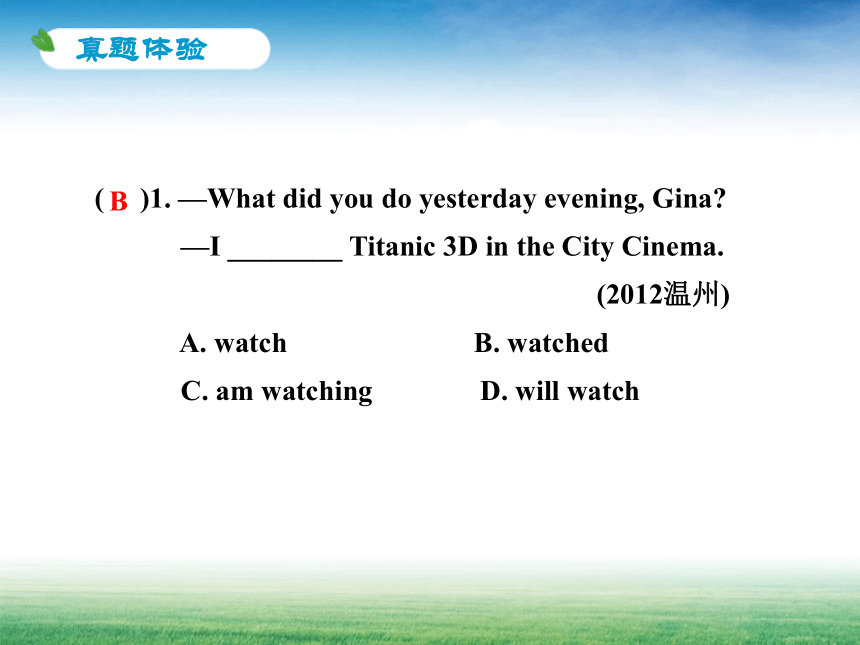
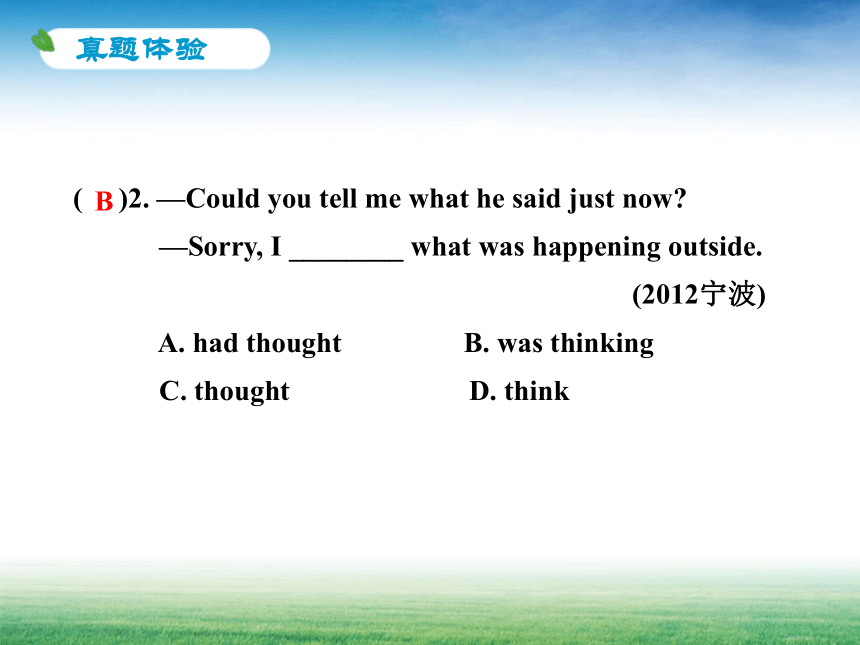
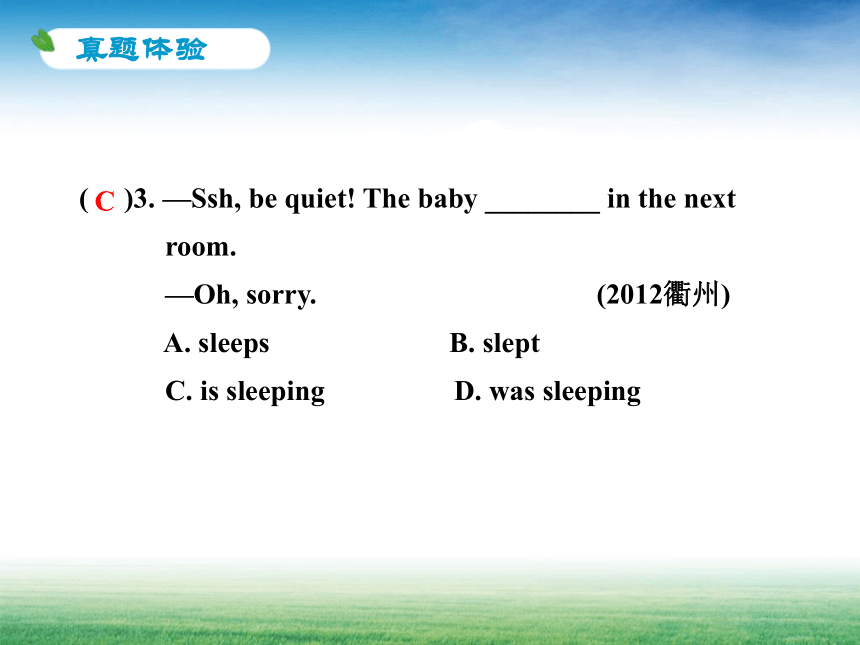
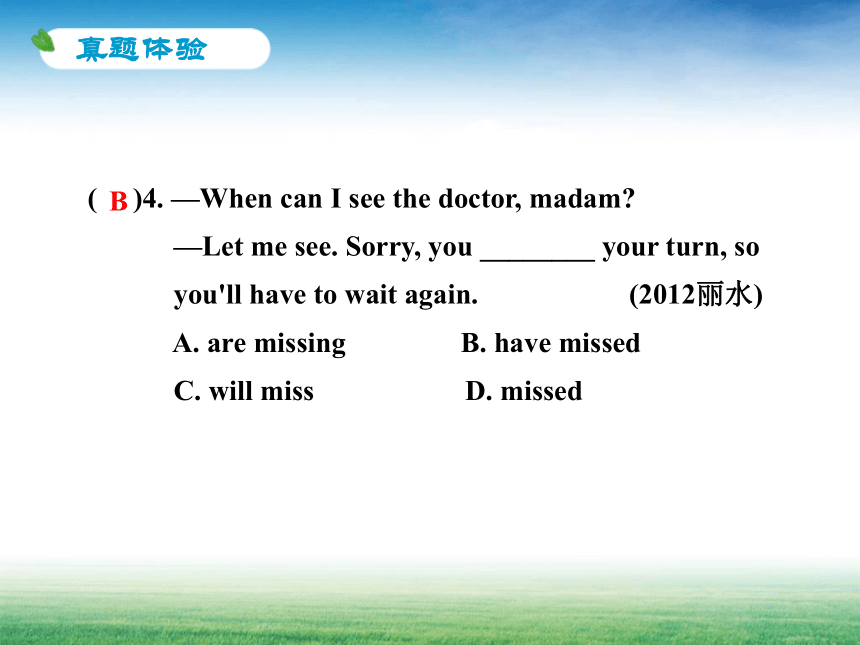
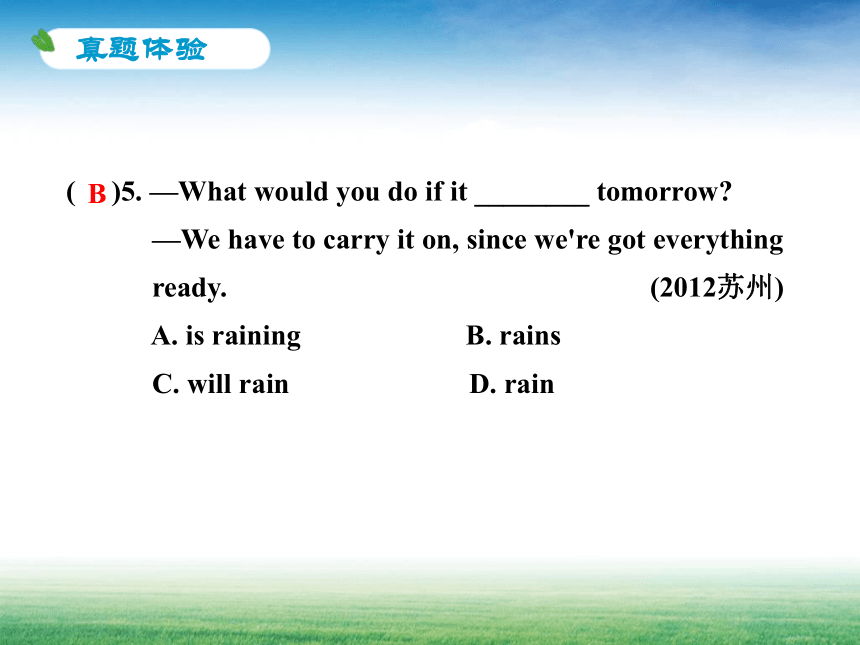

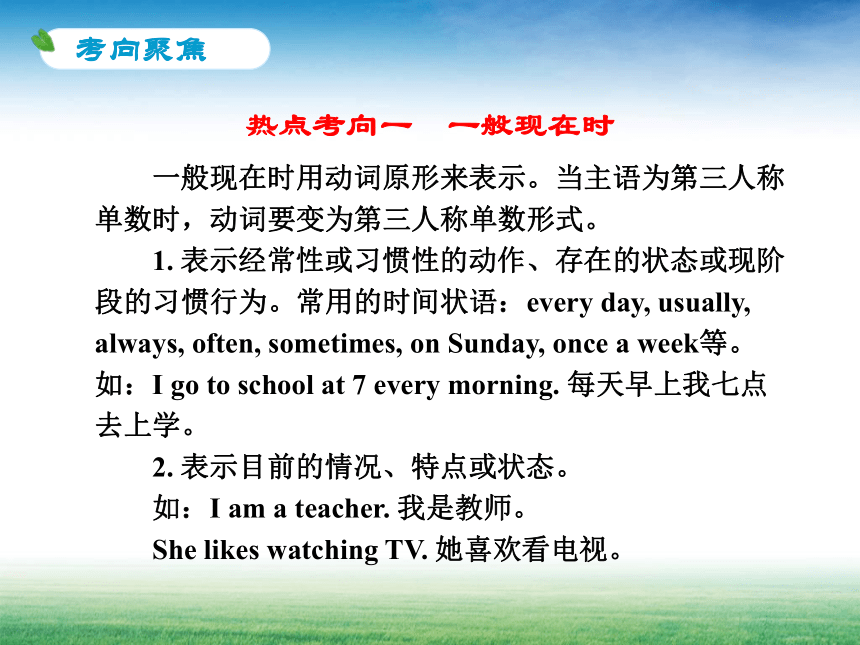
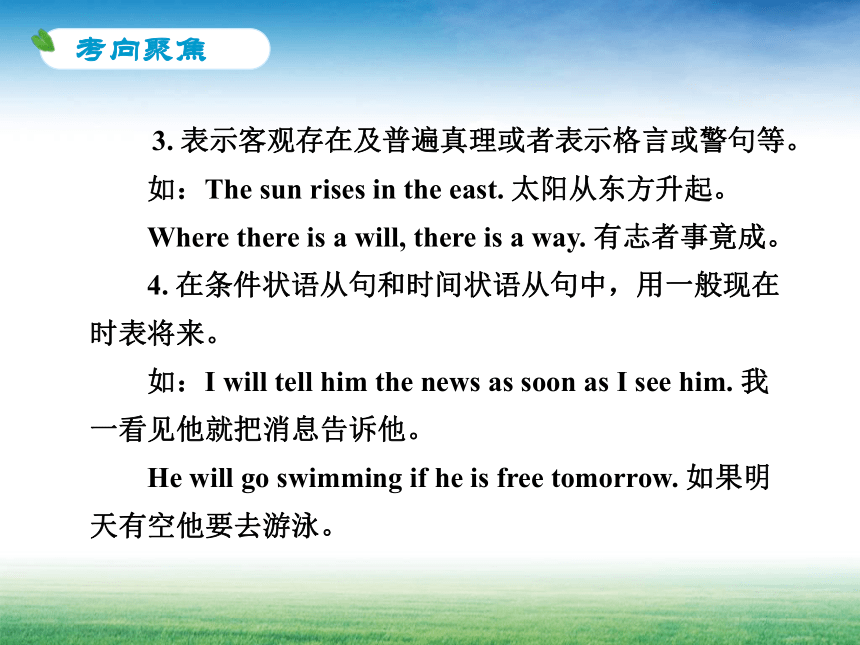
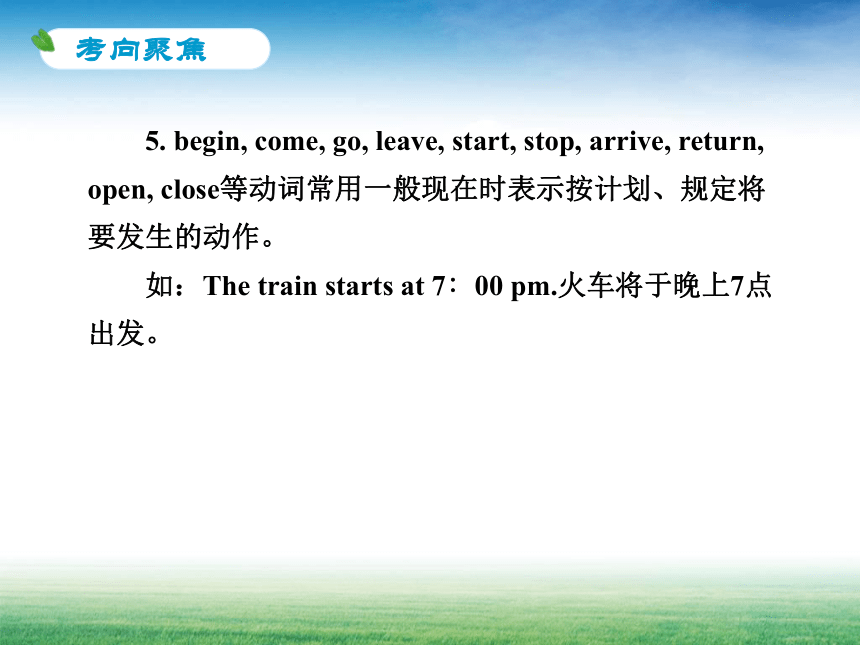
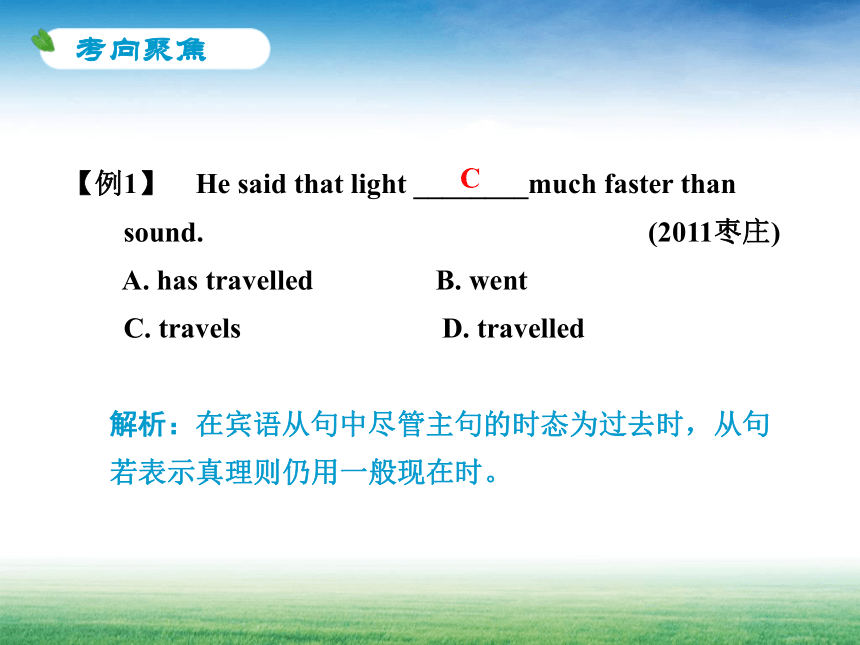
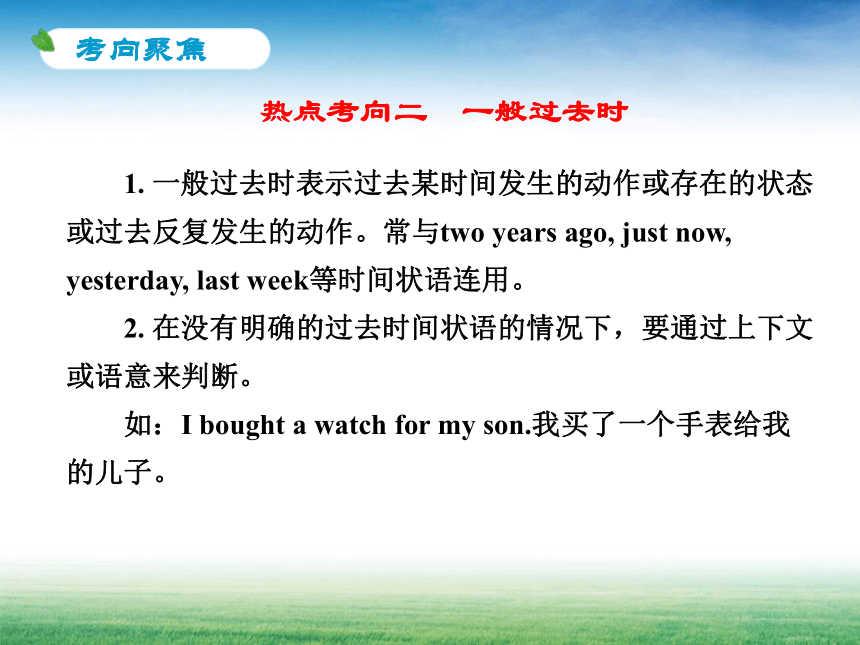
文档简介
课件53张PPT。第29课 动词的时态真题体验( )1. —What did you do yesterday evening, Gina?
—I ________ Titanic 3D in the City Cinema.
(2012温州)
A. watch B. watched
C. am watching D. will watch B真题体验( )2. —Could you tell me what he said just now?
—Sorry, I ________ what was happening outside.
(2012宁波)
A. had thought B. was thinking
C. thought D. thinkB真题体验( )3. —Ssh, be quiet! The baby ________ in the next
room.
—Oh, sorry. (2012衢州)
A. sleeps B. slept
C. is sleeping D. was sleepingC真题体验( )4. —When can I see the doctor, madam?
—Let me see. Sorry, you ________ your turn, so
you'll have to wait again. (2012丽水)
A. are missing B. have missed
C. will miss D. missed B真题体验( )5. —What would you do if it ________ tomorrow?
—We have to carry it on, since we're got everything
ready. (2012苏州)
A. is raining B. rains
C. will rain D. rainB考点解读 动词的时态一直是中考考查的重点内容。对时态的考查主要集中在一般现在时、一般过去时、一般将来时、现在进行时和现在完成时。
考向聚焦热点考向一 一般现在时 一般现在时用动词原形来表示。当主语为第三人称单数时,动词要变为第三人称单数形式。
1. 表示经常性或习惯性的动作、存在的状态或现阶段的习惯行为。常用的时间状语:every day, usually, always, often, sometimes, on Sunday, once a week等。
如:I go to school at 7 every morning. 每天早上我七点去上学。
2. 表示目前的情况、特点或状态。
如:I am a teacher. 我是教师。
She likes watching TV. 她喜欢看电视。考向聚焦 3. 表示客观存在及普遍真理或者表示格言或警句等。
如:The sun rises in the east. 太阳从东方升起。
Where there is a will, there is a way. 有志者事竟成。
4. 在条件状语从句和时间状语从句中,用一般现在时表将来。
如:I will tell him the news as soon as I see him. 我一看见他就把消息告诉他。
He will go swimming if he is free tomorrow. 如果明天有空他要去游泳。考向聚焦 5. begin, come, go, leave, start, stop, arrive, return, open, close等动词常用一般现在时表示按计划、规定将要发生的动作。
如:The train starts at 7∶00 pm.火车将于晚上7点出发。考向聚焦【例1】 He said that light ________much faster than
sound. (2011枣庄)
A. has travelled B. went
C. travels D. travelled
解析:在宾语从句中尽管主句的时态为过去时,从句
若表示真理则仍用一般现在时。
C考向聚焦热点考向二 一般过去时 1. 一般过去时表示过去某时间发生的动作或存在的状态 或过去反复发生的动作。常与two years ago, just now, yesterday, last week等时间状语连用。
2. 在没有明确的过去时间状语的情况下,要通过上下文或语意来判断。
如:I bought a watch for my son.我买了一个手表给我的儿子。考向聚焦【例2】 —Will Mary go to the movie with us?
—I don't think so. She ________ to go shopping.
(2012绍兴)
A. decides B. decided
C. will decide D. has decided
解析:由语境可知“她决定去购物”的行为是过去发
生的。故用一般过去时。B考向聚焦【例3】 —Haven't I told you that you should be home
earlier?
—Yes, but I ________ home earlier than I usually do.
(2012包头)
A. was coming B. will come
C. came D. had come
解析:句意:难道我没告诉你应该早点回来。是,
但是我比平时早点回家。由语境可知“回家”是过
去式。C考向聚焦【例4】 I have been to Shanghai. I ________ there
last month. (2012天津)
A. go B. went
C. have gone D. will go
解析:“last month上个月”表过去时间,须用一
般过去式。B考向聚焦热点考向三 一般将来时 1. 表示将要发生的动作或存在的状态。常与tomorrow, next day, in a few minutes等时间状语连用。
2. 句子基本结构:
(1)will + do. 如: I will go fishing this afternoon. 下午我会去钓鱼。
(2)be going to + do. 表示即将发生的事或打算、计划或准备要做的事。
(3)come, go, arrive, leave, start, begin, return的一般现在时可以表示将来,主要用来表示在时间上已确定或安排好的事。如:
The train leaves at six tomorrow morning. 火车明天上午六点开。考向聚焦 (4)come, go, move, leave, stay等动词的现在进行时可以表示按计划将要发生的事。如:
I'm leaving tomorrow. 明天我要走了。
They are going camping for vacation.他们度假要去野营。
Are you staying here till next week? 你会在这儿呆到下周吗?
(5)在时间状语和条件状语从句中,用一般现在时表示将要发生的事。如:
If you come, I'll be happy.如果你来,我会很高兴。
I'll give him the message, as soon as he comes back.他一回来我就给你消息。考向聚焦【例5】 I hope Tim can come to my birthday. Then we
________ a much happier time. (2012绵阳)
A. have B. had
C. will have D. have had
解析:句意:我希望Tim能来参加我的生日。那么我们
会玩得更高兴。由语境可知“玩得高兴”还未发生。故
用一般将来时。C考向聚焦【例6】 I ________ to the cinema. Would you like to come
with me? (2012大连)
A. go B. am going
C. have gone D. went
解析:由下文“你愿意跟我一起来吗?”可知“去电影
院”还未发生。B考向聚焦【例7】 If there is any change to the plan, I ________ you
as soon as possible. (2011宿迁)
A. told B. have told
C. tell D. will tell
解析:根据上文“如果我有机会”可知还未发生,须用
一般将来时。D考向聚焦热点考向四 现在进行时 1. 现在进行时表示现阶段或说话时正在进行的动作及行为,常和now, at this time, these days等时间状语连用。句子基本结构为:be动词am/is/are+现在分词。
如:Look, they are running.看,他们正在跑步。
Bill is working for our school team.比尔正为我们的校队效力。
2. “系动词+介词或副词”可表示正在进行的动作。 如:He is at work.他在上班。
考向聚焦 3. 现在进行时有时可代替一般将来时,表示按计划即将发生的动作。但此时一般要与表将来的时间状语连用,且只有少数动词有此用法。如:come, go, start, arrive, leave, return, set out/off等。
如:My aunt is coming tomorrow.我的阿姨明天要来。
4. 不用进行时态的情况。
表示感觉、愿望和状态的某些动词,如see, hear, smell, taste,hope, like等。
表示拥有的动词,如have, own, belong等。
表示理解、记忆或决定的动词,如understand, know, remember, forget, decide等。考向聚焦【例8】 —Could you help me do the dishes?
—Sorry, my sister ________ for me outside now.
(2012孝感)
A. waits B. will wait
C. is waiting D. was waiting
解析:now是现在进行时标志性词。
C考向聚焦【例9】 —Please turn off the TV. The baby ________.
—OK. I'll go out for a walk. (2011苏州)
A. sleeps B. slept
C. is sleeping D. was sleeping
解析:联系上文“请关掉电视”和下文“好的,我将出
去散步”可判断用现在进行时表示宝宝正在睡觉。C考向聚焦【例10】 Where‘s Tom? His mother ________ him now.
(2011北京)
A. is looking for B. will look for
C. has looked for D. looks for
解析:now为关键词,意为“现在”,常与现在进行时
连用。A考向聚焦热点考向五 过去进行时 1. 表示过去某段时间或某一时刻正在发生或进行的行为或动作,常与at that time, this time yesterday, at 8 o'clock yesterday evening, when he came in连用。
2. 句子基本结构为:was/were+doing。考向聚焦【例11】 —Where were you this morning?
—I________ in the supermarket. (2012河北)
A. will shop B. am shopping
C. was shopping D. have shopped
解析:询问今天早上你正在哪里,可用过去进行时
回答。C考向聚焦【例12】 —I was at the cinema at nine o'clock yesterday
evening. What about you?
—I ________ TV at home. (2012铜仁)
A. am watching B. was watching
C. will watch D. watched
解析:表述“发生在昨天晚上9点的事”用过去进行时。B考向聚焦热点考向六 现在完成时 1. 句子基本结构:主语+have/has + done(动词过去分词)。
2. 现在完成时表示过去发生或已经完成的动作对现在造成的影响或结果。通常与already, yet, just, from then on, so far, in the past(last) few years连用。句中的谓语动词常用短暂性动词。
3. 现在完成时表示从过去已经开始,持续到现在的动作或状态,并有可能持续下去,常与“since+时间点”或“for+时间段”连用。句中的谓语动词常用延续性动词。
记住一个句型: It is/has been+时间段+since...考向聚焦 4. 表示从过去到现在之间曾经经历过的事,常与never, ever, before, once, three times等连用。句中的谓语动词常用短暂性动词。
5. have/has been to...表示“曾经去过某地”; have/has gone to...表示“去了某地,还没回来”;have/has been in/at...表示在某地呆了多久,且须与表一段时间的状语连用。
注:若have/has been 后接的是地点副词here, there时,则不用介词to, in或at。
考向聚焦 6. 有关短暂性动词:
(1)短暂性动词在现在完成时中不能和表示一段时间的状语连用,但在否定句中可以和表示一段时间的状语连用。
(2)短暂性动词不能出现在由how long引导的疑问句中,但可以和already, never, just, ever, before等连用。
7. 短暂性动词的用法:
(1)短暂性动词与短暂性时间(时间点)连用。
如:He joined the Party three years ago. 他入党三年了(他三年前入党的)。
(2)用“It is/has been+时间段+since...”句型。
如:It is/has been three years since I bought the book. 这本书我买了三年了(从买这本书起到现在已三年了)。考向聚焦 (3)短暂性动词转换成延续性动词或形容词、介词等表状态短语可与“for+时间段”或“since+时间点”连用。考向聚焦【例13】 —Mike, why are you watching TV again?
—I ________ my homework. (2012嘉兴)
A. finish B. finished
C. have finished D. had finished
解析:回答“你为什么又在看电视”可用现在完成时表
述“我已经完成作业”。C考向聚焦【例14】 Alice in wonderland ________ for 15 days and
many of us like the film very much. (2012镇江)
A. begins B. has begun
C. began D. has been on
解析:“for 15 days”表一段时间,与现在完成时连
用;begin是短暂性动词,其完成时不能与表示一段时
间连用,可转换成介词短语be on的完成时。D考向聚焦【例15】 —Are you a soccer player in your school?
—Yes, I ________ the team two years ago. I ________
in the team for two years. (2012宜宾)
A. have joined; have been B. was joined; am
C. joined; was D. joined; have been
解析:“two years ago两年前”过去时间与过去式连
用;“for two years长达两年”一段时间与完成时连
用。D考向聚焦Ⅰ. 用方框中所给词的正确形式填空
travel not work leave write visit
1. —Can I help you?
—I bought the pen yesterday. But it _____________.
2. She told us she ___________ the Summer Palace the next
day.
3. He told me he ____________ a letter to his pen pal when I
called him.
4. They ___________ for England tomorrow.
5. My father told me the light _______ faster than the sound.doesn’t workwould visitwas writingare leavingtravels考向聚焦Ⅱ. 词汇运用
Tom and Linda have been ________ (结婚) for ten years,
but they've never quarreled. (2012黄冈)
2. He borrowed my iPhone 4s and hasn't _________ (归还)
it to me. (2012宁波)
3. The living conditions in the countryside have _________
(改善)a lot. (2012恩施)
4. You've d____ so much wine. You mustn't drive.(2012杭州)
5. Tom and Jerry r___ their bikes to Uncle Ma's Farm twice
a month. (2012宁波)
6. Mr. Zhang _______ (teach) us English three years ago.
(2012滨州)marriedreturnedimprovedrunkidetaught考向聚焦7. —Where's Miss Wang?
—Look, she _________ (talk) with the students.(2012滨州)
8. Mr. Liu isn't here now. He _________ (go) to Beijing.
(2012滨州)
9. Mr. Green ____________ (watch) TV at this time last
night. (2012滨州)
10. There _______ (be) a meeting in our school tomorrow
afternoon. (2012滨州)is talkinghas gonewas watcingwill be领悟语法Ⅲ . 单项选择
( )1. —Mom, when can I go out to play football?
—Finish your homework first, or I ________let
you go out. (2011威海)
A. don't B. didn't
C. won't D. haven't
解析:考查动词词态。句意:妈妈,我什么时候可以出去踢足球?首先完成作业,否则,我不会让你出去的。可知,本句用一般将来时,故选C。C领悟语法( )2. —Let's discuss the plan, shall we?
—Not now. I ________ to an interview.(2012安徽)
A. go B. went
C. am going D. was going
解析:考查动词时态。句意:让我们讨论一下这个计划,好吗?不是现在。我要去做个采访。故选C。C领悟语法( )3. —I called you this morning, but nobody answered
it.
—Oh, we ________ some running in the park.
(2012日照)
A. are doing B. were doing
C. have done D. did
解析:考查动词时态。询问今天早上打电话那个时刻在做什么,须用过去进行时。B领悟语法( )4. Jenny told me that she ________ an English
Speech Contest the next month. (2012上海)
A. takes part in B. is taking part in
C. took part in D. would take part in
解析:考查动词时态。主句谓语动词(told)是一般过去时,从句的时间状语“the next month下个月”表示将来。因此从句的谓语动词须用过去将来时。故选D。D领悟语法( )5. —________ you ________ Jeremy Shu-How Lin?
—Yes. The once-nameless young man became a
basketball hero suddenly. (2012日照)
A. Did; hear B. Do; listen to
C. Have; heard of D. Have; listened to
解析:考查动词时态及词义辨析。hear sb. 听见某人说话;listen to sb.听某人说话;hear of sb.听说某人。句意:你听说林书豪了吗?是的,这个无名英雄突然间成为篮球英雄。故选C。C领悟语法( )6. —Why was he late for school yesterday?
—He overslept. By the time he got to the bus stop,
the bus ________ already ________. (2012襄阳)
A. was; leaving B. has; left
C. would; leave D. had; left
解析:考查动词时态。句意:公交车在他到公交车站前开走了。从句的谓语动词got是过去式,主句的谓语动作发生在从句的谓语动作之前,须用过去完成时。故选D。D领悟语法( )7. —Amy, I called you yesterday evening, but
nobody answered the phone.
—Oh, I ________ a walk with my mother at that
time. (2011宁波)
A. take B. took
C. am taking D. was taking
解析:考查动词时态。根据上文可知打电话发生在昨晚,下文“at that time”意为在“那时候”,推断此处应用过去进行时。故选D。D领悟语法( )8. Mr. White came to our school in 2008, and since
then he ________ us English. (2011盐城)
A. teaches B. taught
C. has taught D. will teach
解析:考查动词时态。since then意为“从那以后到现在为止”,句中的时态为现在完成时。故选C。C领悟语法( )9. Paul and I ________ tennis yesterday. He did
much better than I. (2011北京)
A. play B. will play
C. played D. are playing
解析:考查动词时态。关键词yesterday,须用一般过去时。故选C。C领悟语法( )10. I ________ along the road when I saw Peter. So
we stopped and had a chat. (2011盐城)
A. walked B. was walking
C. would walk D. had walked
解析:考查动词时态。过去进行时与when连用表示过去正在发生某事,突然插入一个时间点。句意:我在沿马路上走的时候看到了彼得。因此我们停下聊了起来。故选B。B领悟语法( )11. My aunt is a writer. She ________ more than ten
books since 1980. (2011北京)
A. writes B. wrote
C. has written D. will write
解析:考查动词时态。由since 1980“自从1980年到现在”,用现在完成时。故选C。C领悟语法( )12. —Alan, it's late. Why not go to bed?
—Jenny hasn't come back yet. I ________ for her.
(2011广东)
A. waited B. have waited
C. am waiting D. was waiting
解析:考查动词时态。由句意“艾伦,很晚了,为什么还不睡?”“詹妮还没有回来。 我________她。”由语境分析,艾伦现在是正在等詹妮回来,应用现在进行时态。故选C。C领悟语法Ⅳ. 用所给动词的正确形式填空
Number 77 High School 1. ___(be) home to three very special young people: Li Huiping, Li Pei and Zhu Ming. These three students all 2. _________(volunteer) their time to help other people. This volunteer work 3. _____(take) each of them several hours a week, so it is a major commitment. Hiping 4. _____(love) to read, and she 5. _____(put) this love to good use by working in the afternoon care center at her local elementary school. Here, she 6. _____(help) young children to read. isvolunteertakeslovesputshelps领悟语法Li Pei loves animals and will be a veterinarian when she 7. ______(leave) school. She spends every Saturday morning 8. ________(work) in an animal hospital. Zhu Ming 9. ______(want) to be a professional singer. He 10. ______(sing) for groups of people at the city hospital to cheer them up. (2012枣庄)leavesworkingwantssings完成考点跟踪训练 29
—I ________ Titanic 3D in the City Cinema.
(2012温州)
A. watch B. watched
C. am watching D. will watch B真题体验( )2. —Could you tell me what he said just now?
—Sorry, I ________ what was happening outside.
(2012宁波)
A. had thought B. was thinking
C. thought D. thinkB真题体验( )3. —Ssh, be quiet! The baby ________ in the next
room.
—Oh, sorry. (2012衢州)
A. sleeps B. slept
C. is sleeping D. was sleepingC真题体验( )4. —When can I see the doctor, madam?
—Let me see. Sorry, you ________ your turn, so
you'll have to wait again. (2012丽水)
A. are missing B. have missed
C. will miss D. missed B真题体验( )5. —What would you do if it ________ tomorrow?
—We have to carry it on, since we're got everything
ready. (2012苏州)
A. is raining B. rains
C. will rain D. rainB考点解读 动词的时态一直是中考考查的重点内容。对时态的考查主要集中在一般现在时、一般过去时、一般将来时、现在进行时和现在完成时。
考向聚焦热点考向一 一般现在时 一般现在时用动词原形来表示。当主语为第三人称单数时,动词要变为第三人称单数形式。
1. 表示经常性或习惯性的动作、存在的状态或现阶段的习惯行为。常用的时间状语:every day, usually, always, often, sometimes, on Sunday, once a week等。
如:I go to school at 7 every morning. 每天早上我七点去上学。
2. 表示目前的情况、特点或状态。
如:I am a teacher. 我是教师。
She likes watching TV. 她喜欢看电视。考向聚焦 3. 表示客观存在及普遍真理或者表示格言或警句等。
如:The sun rises in the east. 太阳从东方升起。
Where there is a will, there is a way. 有志者事竟成。
4. 在条件状语从句和时间状语从句中,用一般现在时表将来。
如:I will tell him the news as soon as I see him. 我一看见他就把消息告诉他。
He will go swimming if he is free tomorrow. 如果明天有空他要去游泳。考向聚焦 5. begin, come, go, leave, start, stop, arrive, return, open, close等动词常用一般现在时表示按计划、规定将要发生的动作。
如:The train starts at 7∶00 pm.火车将于晚上7点出发。考向聚焦【例1】 He said that light ________much faster than
sound. (2011枣庄)
A. has travelled B. went
C. travels D. travelled
解析:在宾语从句中尽管主句的时态为过去时,从句
若表示真理则仍用一般现在时。
C考向聚焦热点考向二 一般过去时 1. 一般过去时表示过去某时间发生的动作或存在的状态 或过去反复发生的动作。常与two years ago, just now, yesterday, last week等时间状语连用。
2. 在没有明确的过去时间状语的情况下,要通过上下文或语意来判断。
如:I bought a watch for my son.我买了一个手表给我的儿子。考向聚焦【例2】 —Will Mary go to the movie with us?
—I don't think so. She ________ to go shopping.
(2012绍兴)
A. decides B. decided
C. will decide D. has decided
解析:由语境可知“她决定去购物”的行为是过去发
生的。故用一般过去时。B考向聚焦【例3】 —Haven't I told you that you should be home
earlier?
—Yes, but I ________ home earlier than I usually do.
(2012包头)
A. was coming B. will come
C. came D. had come
解析:句意:难道我没告诉你应该早点回来。是,
但是我比平时早点回家。由语境可知“回家”是过
去式。C考向聚焦【例4】 I have been to Shanghai. I ________ there
last month. (2012天津)
A. go B. went
C. have gone D. will go
解析:“last month上个月”表过去时间,须用一
般过去式。B考向聚焦热点考向三 一般将来时 1. 表示将要发生的动作或存在的状态。常与tomorrow, next day, in a few minutes等时间状语连用。
2. 句子基本结构:
(1)will + do. 如: I will go fishing this afternoon. 下午我会去钓鱼。
(2)be going to + do. 表示即将发生的事或打算、计划或准备要做的事。
(3)come, go, arrive, leave, start, begin, return的一般现在时可以表示将来,主要用来表示在时间上已确定或安排好的事。如:
The train leaves at six tomorrow morning. 火车明天上午六点开。考向聚焦 (4)come, go, move, leave, stay等动词的现在进行时可以表示按计划将要发生的事。如:
I'm leaving tomorrow. 明天我要走了。
They are going camping for vacation.他们度假要去野营。
Are you staying here till next week? 你会在这儿呆到下周吗?
(5)在时间状语和条件状语从句中,用一般现在时表示将要发生的事。如:
If you come, I'll be happy.如果你来,我会很高兴。
I'll give him the message, as soon as he comes back.他一回来我就给你消息。考向聚焦【例5】 I hope Tim can come to my birthday. Then we
________ a much happier time. (2012绵阳)
A. have B. had
C. will have D. have had
解析:句意:我希望Tim能来参加我的生日。那么我们
会玩得更高兴。由语境可知“玩得高兴”还未发生。故
用一般将来时。C考向聚焦【例6】 I ________ to the cinema. Would you like to come
with me? (2012大连)
A. go B. am going
C. have gone D. went
解析:由下文“你愿意跟我一起来吗?”可知“去电影
院”还未发生。B考向聚焦【例7】 If there is any change to the plan, I ________ you
as soon as possible. (2011宿迁)
A. told B. have told
C. tell D. will tell
解析:根据上文“如果我有机会”可知还未发生,须用
一般将来时。D考向聚焦热点考向四 现在进行时 1. 现在进行时表示现阶段或说话时正在进行的动作及行为,常和now, at this time, these days等时间状语连用。句子基本结构为:be动词am/is/are+现在分词。
如:Look, they are running.看,他们正在跑步。
Bill is working for our school team.比尔正为我们的校队效力。
2. “系动词+介词或副词”可表示正在进行的动作。 如:He is at work.他在上班。
考向聚焦 3. 现在进行时有时可代替一般将来时,表示按计划即将发生的动作。但此时一般要与表将来的时间状语连用,且只有少数动词有此用法。如:come, go, start, arrive, leave, return, set out/off等。
如:My aunt is coming tomorrow.我的阿姨明天要来。
4. 不用进行时态的情况。
表示感觉、愿望和状态的某些动词,如see, hear, smell, taste,hope, like等。
表示拥有的动词,如have, own, belong等。
表示理解、记忆或决定的动词,如understand, know, remember, forget, decide等。考向聚焦【例8】 —Could you help me do the dishes?
—Sorry, my sister ________ for me outside now.
(2012孝感)
A. waits B. will wait
C. is waiting D. was waiting
解析:now是现在进行时标志性词。
C考向聚焦【例9】 —Please turn off the TV. The baby ________.
—OK. I'll go out for a walk. (2011苏州)
A. sleeps B. slept
C. is sleeping D. was sleeping
解析:联系上文“请关掉电视”和下文“好的,我将出
去散步”可判断用现在进行时表示宝宝正在睡觉。C考向聚焦【例10】 Where‘s Tom? His mother ________ him now.
(2011北京)
A. is looking for B. will look for
C. has looked for D. looks for
解析:now为关键词,意为“现在”,常与现在进行时
连用。A考向聚焦热点考向五 过去进行时 1. 表示过去某段时间或某一时刻正在发生或进行的行为或动作,常与at that time, this time yesterday, at 8 o'clock yesterday evening, when he came in连用。
2. 句子基本结构为:was/were+doing。考向聚焦【例11】 —Where were you this morning?
—I________ in the supermarket. (2012河北)
A. will shop B. am shopping
C. was shopping D. have shopped
解析:询问今天早上你正在哪里,可用过去进行时
回答。C考向聚焦【例12】 —I was at the cinema at nine o'clock yesterday
evening. What about you?
—I ________ TV at home. (2012铜仁)
A. am watching B. was watching
C. will watch D. watched
解析:表述“发生在昨天晚上9点的事”用过去进行时。B考向聚焦热点考向六 现在完成时 1. 句子基本结构:主语+have/has + done(动词过去分词)。
2. 现在完成时表示过去发生或已经完成的动作对现在造成的影响或结果。通常与already, yet, just, from then on, so far, in the past(last) few years连用。句中的谓语动词常用短暂性动词。
3. 现在完成时表示从过去已经开始,持续到现在的动作或状态,并有可能持续下去,常与“since+时间点”或“for+时间段”连用。句中的谓语动词常用延续性动词。
记住一个句型: It is/has been+时间段+since...考向聚焦 4. 表示从过去到现在之间曾经经历过的事,常与never, ever, before, once, three times等连用。句中的谓语动词常用短暂性动词。
5. have/has been to...表示“曾经去过某地”; have/has gone to...表示“去了某地,还没回来”;have/has been in/at...表示在某地呆了多久,且须与表一段时间的状语连用。
注:若have/has been 后接的是地点副词here, there时,则不用介词to, in或at。
考向聚焦 6. 有关短暂性动词:
(1)短暂性动词在现在完成时中不能和表示一段时间的状语连用,但在否定句中可以和表示一段时间的状语连用。
(2)短暂性动词不能出现在由how long引导的疑问句中,但可以和already, never, just, ever, before等连用。
7. 短暂性动词的用法:
(1)短暂性动词与短暂性时间(时间点)连用。
如:He joined the Party three years ago. 他入党三年了(他三年前入党的)。
(2)用“It is/has been+时间段+since...”句型。
如:It is/has been three years since I bought the book. 这本书我买了三年了(从买这本书起到现在已三年了)。考向聚焦 (3)短暂性动词转换成延续性动词或形容词、介词等表状态短语可与“for+时间段”或“since+时间点”连用。考向聚焦【例13】 —Mike, why are you watching TV again?
—I ________ my homework. (2012嘉兴)
A. finish B. finished
C. have finished D. had finished
解析:回答“你为什么又在看电视”可用现在完成时表
述“我已经完成作业”。C考向聚焦【例14】 Alice in wonderland ________ for 15 days and
many of us like the film very much. (2012镇江)
A. begins B. has begun
C. began D. has been on
解析:“for 15 days”表一段时间,与现在完成时连
用;begin是短暂性动词,其完成时不能与表示一段时
间连用,可转换成介词短语be on的完成时。D考向聚焦【例15】 —Are you a soccer player in your school?
—Yes, I ________ the team two years ago. I ________
in the team for two years. (2012宜宾)
A. have joined; have been B. was joined; am
C. joined; was D. joined; have been
解析:“two years ago两年前”过去时间与过去式连
用;“for two years长达两年”一段时间与完成时连
用。D考向聚焦Ⅰ. 用方框中所给词的正确形式填空
travel not work leave write visit
1. —Can I help you?
—I bought the pen yesterday. But it _____________.
2. She told us she ___________ the Summer Palace the next
day.
3. He told me he ____________ a letter to his pen pal when I
called him.
4. They ___________ for England tomorrow.
5. My father told me the light _______ faster than the sound.doesn’t workwould visitwas writingare leavingtravels考向聚焦Ⅱ. 词汇运用
Tom and Linda have been ________ (结婚) for ten years,
but they've never quarreled. (2012黄冈)
2. He borrowed my iPhone 4s and hasn't _________ (归还)
it to me. (2012宁波)
3. The living conditions in the countryside have _________
(改善)a lot. (2012恩施)
4. You've d____ so much wine. You mustn't drive.(2012杭州)
5. Tom and Jerry r___ their bikes to Uncle Ma's Farm twice
a month. (2012宁波)
6. Mr. Zhang _______ (teach) us English three years ago.
(2012滨州)marriedreturnedimprovedrunkidetaught考向聚焦7. —Where's Miss Wang?
—Look, she _________ (talk) with the students.(2012滨州)
8. Mr. Liu isn't here now. He _________ (go) to Beijing.
(2012滨州)
9. Mr. Green ____________ (watch) TV at this time last
night. (2012滨州)
10. There _______ (be) a meeting in our school tomorrow
afternoon. (2012滨州)is talkinghas gonewas watcingwill be领悟语法Ⅲ . 单项选择
( )1. —Mom, when can I go out to play football?
—Finish your homework first, or I ________let
you go out. (2011威海)
A. don't B. didn't
C. won't D. haven't
解析:考查动词词态。句意:妈妈,我什么时候可以出去踢足球?首先完成作业,否则,我不会让你出去的。可知,本句用一般将来时,故选C。C领悟语法( )2. —Let's discuss the plan, shall we?
—Not now. I ________ to an interview.(2012安徽)
A. go B. went
C. am going D. was going
解析:考查动词时态。句意:让我们讨论一下这个计划,好吗?不是现在。我要去做个采访。故选C。C领悟语法( )3. —I called you this morning, but nobody answered
it.
—Oh, we ________ some running in the park.
(2012日照)
A. are doing B. were doing
C. have done D. did
解析:考查动词时态。询问今天早上打电话那个时刻在做什么,须用过去进行时。B领悟语法( )4. Jenny told me that she ________ an English
Speech Contest the next month. (2012上海)
A. takes part in B. is taking part in
C. took part in D. would take part in
解析:考查动词时态。主句谓语动词(told)是一般过去时,从句的时间状语“the next month下个月”表示将来。因此从句的谓语动词须用过去将来时。故选D。D领悟语法( )5. —________ you ________ Jeremy Shu-How Lin?
—Yes. The once-nameless young man became a
basketball hero suddenly. (2012日照)
A. Did; hear B. Do; listen to
C. Have; heard of D. Have; listened to
解析:考查动词时态及词义辨析。hear sb. 听见某人说话;listen to sb.听某人说话;hear of sb.听说某人。句意:你听说林书豪了吗?是的,这个无名英雄突然间成为篮球英雄。故选C。C领悟语法( )6. —Why was he late for school yesterday?
—He overslept. By the time he got to the bus stop,
the bus ________ already ________. (2012襄阳)
A. was; leaving B. has; left
C. would; leave D. had; left
解析:考查动词时态。句意:公交车在他到公交车站前开走了。从句的谓语动词got是过去式,主句的谓语动作发生在从句的谓语动作之前,须用过去完成时。故选D。D领悟语法( )7. —Amy, I called you yesterday evening, but
nobody answered the phone.
—Oh, I ________ a walk with my mother at that
time. (2011宁波)
A. take B. took
C. am taking D. was taking
解析:考查动词时态。根据上文可知打电话发生在昨晚,下文“at that time”意为在“那时候”,推断此处应用过去进行时。故选D。D领悟语法( )8. Mr. White came to our school in 2008, and since
then he ________ us English. (2011盐城)
A. teaches B. taught
C. has taught D. will teach
解析:考查动词时态。since then意为“从那以后到现在为止”,句中的时态为现在完成时。故选C。C领悟语法( )9. Paul and I ________ tennis yesterday. He did
much better than I. (2011北京)
A. play B. will play
C. played D. are playing
解析:考查动词时态。关键词yesterday,须用一般过去时。故选C。C领悟语法( )10. I ________ along the road when I saw Peter. So
we stopped and had a chat. (2011盐城)
A. walked B. was walking
C. would walk D. had walked
解析:考查动词时态。过去进行时与when连用表示过去正在发生某事,突然插入一个时间点。句意:我在沿马路上走的时候看到了彼得。因此我们停下聊了起来。故选B。B领悟语法( )11. My aunt is a writer. She ________ more than ten
books since 1980. (2011北京)
A. writes B. wrote
C. has written D. will write
解析:考查动词时态。由since 1980“自从1980年到现在”,用现在完成时。故选C。C领悟语法( )12. —Alan, it's late. Why not go to bed?
—Jenny hasn't come back yet. I ________ for her.
(2011广东)
A. waited B. have waited
C. am waiting D. was waiting
解析:考查动词时态。由句意“艾伦,很晚了,为什么还不睡?”“詹妮还没有回来。 我________她。”由语境分析,艾伦现在是正在等詹妮回来,应用现在进行时态。故选C。C领悟语法Ⅳ. 用所给动词的正确形式填空
Number 77 High School 1. ___(be) home to three very special young people: Li Huiping, Li Pei and Zhu Ming. These three students all 2. _________(volunteer) their time to help other people. This volunteer work 3. _____(take) each of them several hours a week, so it is a major commitment. Hiping 4. _____(love) to read, and she 5. _____(put) this love to good use by working in the afternoon care center at her local elementary school. Here, she 6. _____(help) young children to read. isvolunteertakeslovesputshelps领悟语法Li Pei loves animals and will be a veterinarian when she 7. ______(leave) school. She spends every Saturday morning 8. ________(work) in an animal hospital. Zhu Ming 9. ______(want) to be a professional singer. He 10. ______(sing) for groups of people at the city hospital to cheer them up. (2012枣庄)leavesworkingwantssings完成考点跟踪训练 29
同课章节目录
- 词法
- 名词
- 动词和动词短语
- 动词语态
- 动词时态
- 助动词和情态动词
- 非谓语动词
- 冠词
- 代词
- 数词和量词
- 形容词副词及其比较等级
- 介词和介词短语
- 连词和感叹词
- 构词法
- 相似、相近词比较
- 句法
- 陈述句
- 一般疑问句和否定疑问句
- 特殊疑问句及选择疑问句
- 反意疑问句
- 存在句(There be句型)
- 宾语从句
- 定语从句
- 状语从句
- 主谓一致问题
- 简单句
- 并列句
- 复合句
- 主谓一致
- 主、表语从句
- 名词性从句
- 直接引语和间接引语
- 虚拟语气
- 感叹句
- 强调句
- 倒装句
- 祈使句
- 句子的成分
- 句子的分类
- 题型专区
- 单项选择部分
- 易错题
- 完形填空
- 阅读理解
- 词汇练习
- 听说训练
- 句型转换
- 补全对话
- 短文改错
- 翻译
- 书面表达
- 任务型阅读
- 语法填空
- 其他资料
